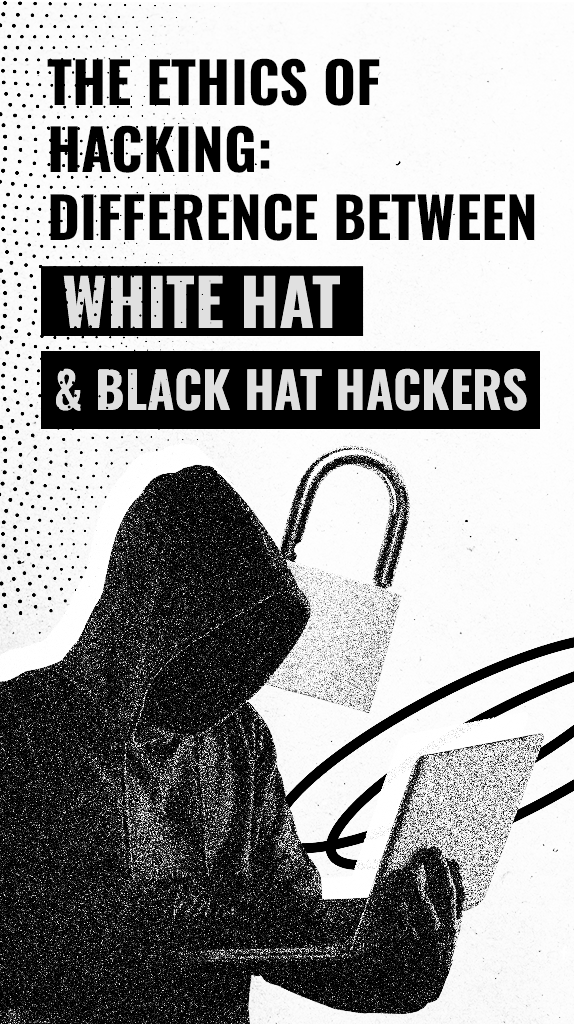Introduction
With the rise of technology and the interconnectedness of our world, hacking has become an increasingly prevalent concern. Hacking refers to gaining unauthorized access to computer systems or networks, often with malicious intent. However, not all hacking is inherently wrong or unethical. There are different types of hackers, each with motivations and ethical considerations. This article explores the ethics of hacking and highlights the distinction between white hat, black hat, and grey hat hackers.
Defining Hacking
Hacking involves exploring and manipulating computer systems, networks, or software. While hacking often carries a negative connotation due to its association with cybercrime, it is essential to recognize that not all hacking activities are malicious. Hacking can be categorized into two primary groups: white hat hacking and black hat hacking.
1. White Hat Hackers
White hat hackers, or ethical hackers or security researchers, engage in hacking activities to identify vulnerabilities and enhance cybersecurity. They work in organizations or independently and are often employed to conduct penetration testing or security audits. White hat hackers use their skills to help organizations identify weaknesses in their systems and protect against potential cyber threats.
The critical ethical principle that guides white hat hackers is their commitment to obtaining proper authorization before attempting to access a computer system. They operate within the boundaries of the law and adhere to a code of conduct that emphasizes responsible disclosure. When white hat hackers discover vulnerabilities, they report them to the relevant authorities or system owners rather than exploiting them for personal gain.
2. Black Hat Hackers
On the other end of the ethical spectrum, black hat hackers engage in hacking activities for personal gain or with malicious intent. They often break into computer systems, steal sensitive information, or cause damage to networks. Black hat hackers are typically associated with cybercrime, as their actions violate the law and compromise the security and privacy of individuals and organizations.
Unlike white hat hackers, black hat hackers operate without legal authority or ethical guidelines. Their activities are motivated by financial gain, political agendas, or a desire for personal satisfaction. Black hat hackers exploit vulnerabilities in computer systems to access sensitive information, commit fraud, launch cyber attacks, or engage in other illicit activities.
3. Gray Hat Hackers
In addition to white hat and black hat hackers, there is a third category known as gray hat hackers. Gray hat hackers fall somewhere between the two extremes, as their actions may not be explicitly malicious but operate without proper authorization. These individuals may uncover vulnerabilities in systems without explicit permission, but their intentions are often less clear-cut than those of white or black-hat hackers.
Gray hat hackers may expose vulnerabilities publicly to raise awareness or pressure organizations into addressing security issues. While their actions may help improve cybersecurity, their methods could be more ethically ambiguous since they bypass the legal framework and system owner consent.
The Ethical Debate
The ethics of hacking have sparked considerable debate in cybersecurity and beyond. Proponents of ethical hacking argue that white hat hackers play a crucial role in identifying vulnerabilities and improving overall security. They believe ethical hacking can help organizations become more resilient against cyber threats and safeguard valuable data.
Critics, however, express concerns about the potential misuse of hacking techniques, even if employed for beneficial purposes. They argue that hacking, regardless of intent, involves unauthorized access and violates the privacy and rights of individuals. Additionally, the fear remains that white hat hackers may cross ethical boundaries or unintentionally cause harm while conducting their activities.
Legal Framework
Given the potential for misuse and harm, legal frameworks have been established to address hacking activities. Many countries have enacted laws criminalizing unauthorized access, data theft, and other cybercrimes. These laws help differentiate between ethical and unethical hacking by emphasizing the importance of proper authorization and informed consent.
Furthermore, some countries have implemented legislation that provides legal protection to white hat hackers who engage in ethical hacking activities with proper authorization. These laws encourage responsible disclosure and foster collaboration between security researchers and organizations.
Conclusion
The ethics of hacking are complex and multifaceted. While black hat hackers engage in illegal activities for personal gain, white hat hackers employ their skills ethically to enhance cybersecurity. The distinction between these two categories lies in their motivations and adherence to legal and ethical guidelines. Gray hat hackers occupy a middle ground; their intentions and actions often must be clearer. As a profession, ethical hacking is fast gaining popularity due to the high prevalence of cyberthreats resulting from greater reliance on digital devices.
Two certifications are primarily sought after by cybersecurity enthusiasts looking to enter the world of ethical hacking - Certified Ethical Hacker (CEH) and Security+.
Many training organizations offer courses to help professionals pass these coveted certifications and acquire validation for their skills. InfosecTrain is one of the authorized training providers specialized in providing cybersecurity training and certifications including CEH, Security+, CISSP, CISA, CISM and more.
By understanding the dynamics used by black hat hackers, ethical hackers can help safeguard data and systems from malicious intent and work towards a safer and more secure digital future.
Media Contact
Company Name: InfosecTrain (An Intiative by Azpirantz Technologies LLP)
Contact Person: Vikas Agrawal
Email: Send Email
Phone: 18008437890
Address:C19 (2nd floor), Block C, Sector 2
City: Noida
State: Uttar Pradesh 201301
Country: India
Website: www.infosectrain.com





